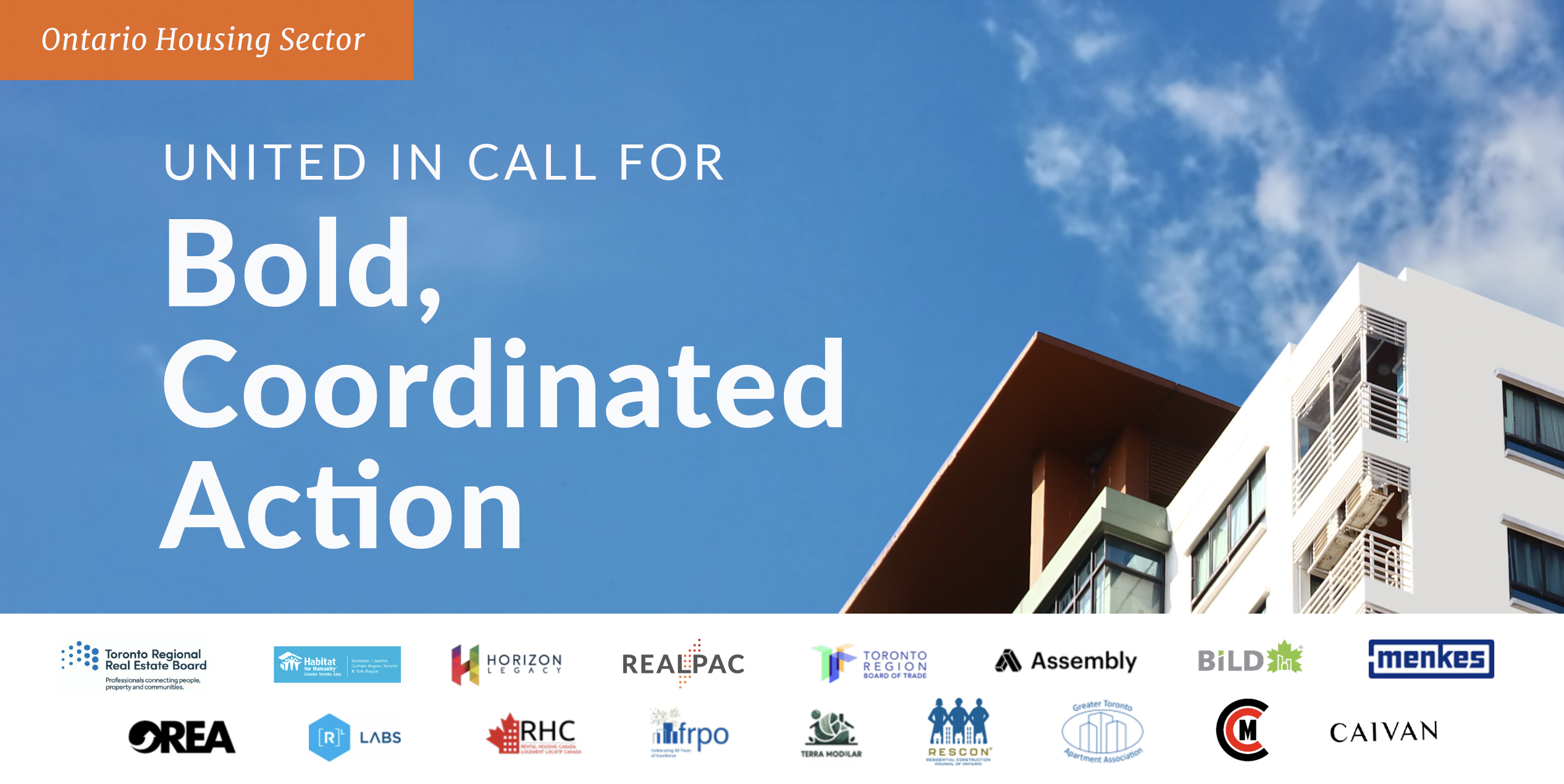Joint Statement: Ontario’s Housing Sector United in Call for Bold, Coordinated Action

Toronto, October 27, 2025 – Ontario is facing a housing emergency. Projects are stalling, builders are cancelling developments, and families and individuals are being priced out of the market.
As the provincial and federal governments prepare to release their fall economic statement and budget respectively, our message is urgent: bold, coordinated action is needed to boost housing construction, lower costs, and bring affordability back within reach for residents.
Housing is more than just shelter; it’s the foundation of our economy and the heart of our communities. Today, Ontario’s housing sector, from builders, REALTORS®, business groups, trade associations, not-for-profit organizations and rental providers, speaks with one clear voice. Together with governments at all levels, we must move swiftly to unlock housing supply, cut costs, and restore affordability by accelerating ownership and rental housing delivery.
We acknowledge the positive work done so far by the federal, provincial, and municipal governments regarding policy developments, zoning reform, and funding programs to encourage more housing construction, including the most recent provincial housing bill, Fighting Delays, Building Faster Act, 2025, which signals the government’s intention to take further practical steps in cutting red tape, lowering construction costs and restoring confidence and investment in the rental housing market by speeding up slow resolution processes to adjudicate landlord and tenant disputes. Other efforts include the Housing Accelerator Fund, the Apartment Construction Loan Program, Build Canada Homes, the Building Ontario Fund, the Municipal Housing Infrastructure Program, reform to end exclusionary zoning and allow as-of-right construction of multi-plexes on single lots, and the Building Faster Fund, among other projects. However, more action is still needed.
We also recognize that potential disruptions impacting the housing ecosystem that are outside the direct control of governments and industry, such as trade wars, geopolitical tensions and economic uncertainty need to be considered as we navigate an uncertain environment at the macro level.
Housing remains the backbone of Canada’s economy. It supports over 1.2 million jobs and contributes more than $143 billion in economic activity yearly to Canada’s Gross Domestic Product (GDP). However, rising costs, difficult regulatory environments, economic uncertainty, and constrained supply have slowed new housing starts and home purchases, putting tens of thousands of skilled trade jobs at risk. This will impact spin-off economic activity in related sectors and push both home ownership and rental housing further out of reach for many residents.
To meet Ontario and Canada’s housing challenge, a united focus on delivery is required. By reducing construction costs, attracting investments, and aligning tax policy, zoning, and approval systems, governments at all levels can restore confidence, protect jobs, and support innovation at the speed, and scale Canadians urgently need.
Policy Priorities for Immediate Action
To restore affordability and confidence in the housing market, we are calling on municipal, provincial, and federal governments to work collaboratively with the housing sector by adopting the following measures:
- Position and Profile Housing as an Economic Driver: To ensure housing policy is economic policy, recognize housing construction and trade as a core driver of employment and GDP, adopt a framework to preserve the tremendous job creation that the housing industry generates, and acknowledge that housing unaffordability is also affecting our overall economic productivity, especially in the Greater Toronto Hamilton Area (GTHA).
- Modernize Outdated Tax Rules: Extend the GST/HST exemption on new homes up to $1.5 million for homebuyers, reflecting current market realities, particularly in major urban centres, and encouraging new construction.
- Cut Costs for Homebuyers: Align cost recovery with actual service delivery and housing goals to reduce barriers to construction and costs to homebuyers. Municipalities and provinces need to collaborate with industry to modernize the fee structure applied to new housing, which is currently inflating housing costs and constraining new supply.
- Build Faster Through Innovation in Parallel to Traditional Building: Support the advent, inclusion and expansion of modern construction methods – including panelized systems, modular building, robotics, and other emerging technologies that embrace productivity, reduce costs and construction time, and enable homebuilding at scale. These need to be supported by an innovation policy framework created in partnership with the industry that provides incentives for early adopters and customers of new solutions, as well as investments in Canadian companies providing new solutions. Scaling up pioneering methods should be done in addition to supporting the ongoing innovation and productivity of traditional construction techniques.
- Free Up Land and End Exclusionary Zoning: Act decisively to end outdated zoning restrictions to permit gentle density and a wider mix of housing types, especially missing-middle and multi-unit dwellings in more communities.
- Incentivize Private Capital: Encourage programs that incentivize private capital, both investment and philanthropic, for both rental and ownership housing to accelerate market and non-market construction. This should include reintroducing the Multiple Unit Residential Building (MURBS) tax incentive.
The housing sector stands ready to partner with every level of government. Together, we can reignite momentum, rebuild confidence, restore affordability through partnership, innovation, and investment, and deliver the homes our communities urgently need.
Signed:
- John DiMichele, CEO, Toronto Regional Real Estate Board
- Tony Irwin, President & CEO, Federation of Rental-housing Providers of Ontario / Rental Housing Canada
- Richard Lyall, President, Residential Construction Council of Ontario
- Ene Underwood, CEO, Habitat for Humanity GTA
- Daryl Chong, President & CEO, Greater Toronto Apartment Association
- Roselle Martino, Executive VP, Policy & Strategic Affairs, Toronto Region Board of Trade
- Michael Brooks, CEO, Real Property Association of Canada
- Dave Wilkes, President & CEO, Building Industry and Land Development Association
- Luigi Favaro, CEO, Ontario Real Estate Association
- George Carras, CEO, R-LABS Canada
- Kathy Hogeveen, Chief of Operations, Assembly Corp.
- Frank Cairo, Co-Founder & CEO, Caivan Communities
- Jonathan Nusbaum, CEO, Terra Modular
- Jude Tersigni, VP, Planning and Development, Menkes Developments
- Nhung Nguyen, CEO, Horizon Legacy
- Marlon Bray, Executive VP, Clark Construction Management


